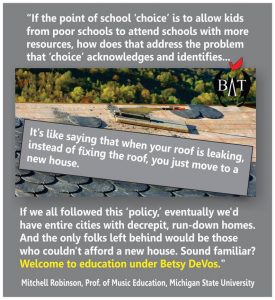
I just got home from Pittsburgh where Chris Savage and I were covering the Public Education Forum for Eclectablog, and have been looking forward to sharing my thoughts on what transpired. Before we get to the candidates’ performances, I want to make sure to congratulate the organizers of this event, especially Randi Weingarten of the American Federation of Teachers, and Lily Eskelin-Garcia of the National Education Association.
Each of the presidents of the two major national teachers’ unions gave excellent opening speeches. Both of these women showed why they were such strong leaders for their respective organizations; they were powerful, passionate, and inspirational as they summarized the issues facing the profession, and targeted the subjects they hoped each of the candidates would be addressing during the forum. It was a great way to start the day.
A few of my really smart friends (I see you Carol Burris, and Steven Singer, and Peter Greene) who were also at the event have already beaten me to the punch and posted their reviews, and I encourage you to check them out. While all of us agree on most of what we heard, each of these master teachers and writers has put their own touch on the happenings in the Steel City, and each of their reports is well worth reading. Even though I was “in the room where it happened” along with all of them, I learned so much from each of their analyses–so thank you!
In the spirit of our country’s current rather draconian approach to “accountability” in public education, I thought I’d describe the candidates’ performances on Saturday by rating them on the Danielson teacher evaluation rubric, a common teacher evaluation system used by many school districts across the nation. That means that each candidate will be graded on a simplistic, reductionist, atomistic, 4-point scale of the sort loved by corporate education reformers, as though it makes sense to distill the entirety of an individual’s performance on a complicated set of tasks to a single number between 1 and 4.
For readers who don’t have a teacher in their immediate family (making them unlike nearly all of the candidates at the Public Education Forum, most of whom claimed a mother, sister, or spouse who was a teacher), the rubric looks something like this:
Highly Effective = 4
Effective = 3
Developing = 2
Ineffective = 1
And because a few of the candidates still seem to believe that using students’ test scores to evaluate teachers is a good idea, in spite of the mountains of empirical evidence to the contrary, I’ll also be using my own version of VAM (value-added modeling) to add some, shall we say, richer context to their rubric scores.
So, without further ado…the ratings:
Sen. Michael Bennet
 Bennet began by claiming to be the “first superintendent ever to run for president,” a boast that might have gone over better with this crowd if Bennet had ever studied education (he did not), or taught (he did not) before beginning his career in education as superintendent of Denver’s schools.
Bennet began by claiming to be the “first superintendent ever to run for president,” a boast that might have gone over better with this crowd if Bennet had ever studied education (he did not), or taught (he did not) before beginning his career in education as superintendent of Denver’s schools.
Bennet then moved on to one his favorite talking points–setting up the false choice that free preschool would be a better use of tax dollars than free public college and university tuition. As if this was an episode of Highlander instead of a serious policy discussion, and “there can be only one.”
He then pivoted to what would become a common theme among the candidates, the need for better teacher pay…but Bennet’s suggestion to pay teachers more came with some pretty shocking strings attached: a call for a 6 day school week, and year-round schools–especially for urban schools…
I think kids should have to go to school six days a week. 181 days is not enough if you’re a kid living in poverty in this country. #PublicEdForum
— Michael Bennet (@MichaelBennet) December 14, 2019
Neither of these ideas gained much traction with a room full of students and teachers–none of whom, it should be pointed out, would have been able to attend this Saturday forum if Bennet’s ideas were put into policy.
Bennet was then asked about one of his most controversial policies in Denver, a merit pay proposal that many in Colorado believe led to the Denver teachers strike. His response was pretty bizarre (“In fairness to me…”), claiming he wasn’t the superintendent when that proposal actually was implemented, throwing his successor under the bus, and suggesting that it was a “win-win” for all involved. (Narrator’s voice: “It was not.”)
Bennet wrapped up his time on stage with a plea for better equity in America’s schools, but I don’t think that the “equity” Michael Bennet is talking (well, yelling) about is the same sort of “equity” that parents and teachers are talking about.
For Bennet, equity is a beard for charters and privatization.
For the rest of us, equity is a level playing field for all kids.
As if to emphasize this distinction, Bennet followed up his performance at the Public Education Forum with a visit to a group of charter school activists who were protesting outside of the venue…
How we treat the next generation is how we'll be judged. Nobody should be expendable in the United States of America.
These parents are fighting for their kids. As the first superintendent to run for president, I’m fighting alongside them. #PowerfulParentNetwork #WhatAboutUs pic.twitter.com/MuMsSsWeYn
— Michael Bennet (@MichaelBennet) December 14, 2019
…an appearance that amounted to a pointed jab at the 1500 public education supporters who had invited him to speak at the forum–as if to say, “I accepted this invitation from the two teachers unions whose members teach 90% of the nation’s children, but my real sympathies lie with the union-busting charter schools, that are publicly-funded but privately-governed, and educate about 4.6% of our school-aged students.”
As I have written before about Sen. Bennet…
Bennet seems to have realized that his record as a pro-charter, anti-teacher corporate reformer may prove to become a drag on his candidacy for president, and has attempted to distance himself from the Trump/DeVos education agenda–such as it is–with a public statement criticizing the Secretary, calling her nomination “an insult to schoolchildren and their families, to teachers and principals, and to communities fighting to improve their public schools all across this country”.
Given the alignment of Bennet’s education policy positions with those of Ms. DeVos, this is an exceedingly narrow needle to try to thread:
- both Bennet and DeVos are big supporters of charter schools, and enemies of teachers unions–Bennet was a disciple of hedge fund guru Phillip Anschutz, the founder of a billion dollar anti-education foundation and owner of the publishing company “behind the anti-teachers’ union movies ‘Won’t Back Down’ and ‘Waiting for ‘Superman’”–as a result, Denver now has more charter and “innovation” schools than traditional public schools
- both Bennet and DeVos favor “school choice”, a policy that has been toxic in both DeVos’ home state of Michigan, and Bennet’s adopted state of Colorado
- both Bennet and DeVos are ardent supporters of alternative certification programs, like Teach for America, that provide a “fast track” to the classroom for uncertified and unqualified applicants, and replace veteran teachers with short-term “edutourists”
- both Bennet and DeVos are proponents of “portfolio school districts,” an approach to school organization and governance that’s proven to be a disaster in New Orleans and many other communities
- both Bennet and DeVos have targeted teachers’ pension funds as a means of destabilizing school systems and hastening the glide path to privatization
Bennet’s comments were, to me, a hodgepodge of platitudes and well-rehearsed neoliberal talking points, delivered in a quasi-passionate manner designed to show how “angry” he is about unfairness. Like many in the audience, I was not convinced.
Bennet’s rating: 1 = poor policy ideas, lack of support for public education; INEFFECTIVE
Rating with VAM: -2 = courting the charter protesters outside the venue? suggesting a 6 day work week? Terrible, Horrible, No Good, Very Bad Presidential Candidate
Mayor Pete Buttigieg
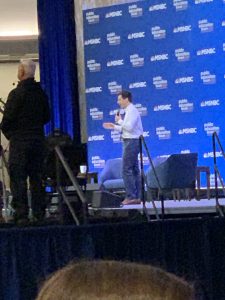 Buttigieg took the stage with a bouncy, boisterous burst of energy, shouting that he was the “child of two teachers, married to a teacher”, in what appeared to be an attempt to form a connection to the crowd. To be sure, Buttigieg did an excellent job of outlining the demands and expectations placed on teachers, maybe the best of all the candidates. But for a person who has branded himself as a technocrat-y policy wonk, Buttigieg’s time on the stage was curiously devoid of much in the way of, well…policy.
Buttigieg took the stage with a bouncy, boisterous burst of energy, shouting that he was the “child of two teachers, married to a teacher”, in what appeared to be an attempt to form a connection to the crowd. To be sure, Buttigieg did an excellent job of outlining the demands and expectations placed on teachers, maybe the best of all the candidates. But for a person who has branded himself as a technocrat-y policy wonk, Buttigieg’s time on the stage was curiously devoid of much in the way of, well…policy.
One of the first questions posed to the mayor had to do with the “teacher shortage”. His proposal was to partner with teacher preparation programs to create a “credential” that’s portable across state lines…if the recipient agrees to teach in a Title 1 school for 7 years. While I’m not sure how this “credential” would increase the supply of teachers, I had the uncomfortable feeling that it was little more than a Trojan Horse type approach to further increase the number of “alternatively prepared” edutourists in our schools, such as the Teach for America recruits who have displaced thousands of experienced teachers in schools across the country. Given the presence of Teach for America alums as advisers on Buttigieg’s campaign staff, I’m afraid I’m right.
Buttigieg finished his session by recycling the worn-out reformster argument from Raj Chetty, that “a good kindergarten teacher is worth $300,000 to a kindergarten student’s earnings over time,” an idea that’s just…well…silly. What it does do is align with Buttigieg’s technocratic world view: that things are only valuable when they can be measured, preferably in dollars and cents. It’s the way that a McKinsey consultant whose number crunching results in firing nearly a thousand employees at a Michigan health insurance company might think about making education seem “valuable,” by reducing the quality of one’s educational experience to a simple cost-benefit analysis–but it’s not how students, teachers, or parents value the education offered in their community’s schools.
Buttigieg’s rating: 3 = good outline of challenges faced by teachers; EFFECTIVE
Rating with VAM: 1 = backdoor TFA? measuring education in $s? Pete has listened to his husband…still unclear if he’s listened to other teachers; INEFFECTIVE
Sen. Elizabeth Warren
 Warren received one of the two strongest and most enthusiastic receptions from the crowd of public school teachers, students, and union officials in the hall. She used her two-minute opening spiel to describe how she would pay for the ambitious agenda outlined in her education plan (a 2 cent tax on high wealth individuals; 3 cents for billionaires), promised to get rid of high stakes testing (loud applause), and a lot more very specific policy ideas.
Warren received one of the two strongest and most enthusiastic receptions from the crowd of public school teachers, students, and union officials in the hall. She used her two-minute opening spiel to describe how she would pay for the ambitious agenda outlined in her education plan (a 2 cent tax on high wealth individuals; 3 cents for billionaires), promised to get rid of high stakes testing (loud applause), and a lot more very specific policy ideas.
It turns out that she does have a plan for that.
I was struck by Warren’s easy ability to explicitly explain policy strategies to do what some of the other candidates have said would be good ideas, but offered no specific ideas for making them happen.
Teachers like specifics.
She also delivered what turned out to be one of the best lines of the night when she said, to thunderous applause, “Public school money needs to stay in public schools.”
>> @ewarren at the #publicedforum: "Public school money needs to stay in public schools". Crowd cheers loud enough for the charter school shills out on the street to hear them.
— Chris Savage (@Eclectablog) December 14, 2019
It’s amazing that we need to say this, but here we are. One candidate stating the obvious, while another candidate was outside the hall promising to do exactly the opposite.
In a bit of a puzzling twist, one of the MSNBC moderators, Rehema Ellis of NBC Education Nation fame, pushed Warren hard on her stance on charter school funding support. Ellis claimed, incorrectly, that Warren’s plan cut funding for all charters; Warren pointed out several times, politely but firmly, that her plan only cut support for new charters. The exchange grew testy at one point:
Wow, @rehemaellis makes a face when Elizabeth Warren mentions her 2 cent tax for the umpteenth time, Warren scolds her. "You… give me that face!" pic.twitter.com/iTpdPvq971
— Tommy X-TrumpIsARacist-opher (@tommyxtopher) December 14, 2019
Throughout her time on the stage, Warren did something remarkable–she actually answered the questions asked, and didn’t try to tap dance around the uncomfortable stuff she doesn’t want to address. It was, for me, as refreshing as it was remarkable–and I found myself wondering what it would be like to have a president who speaks honestly and directly again.
Warren’s rating: 4 = substantive policy ideas, clear and concise, understands the importance of public education; HIGHLY EFFECTIVE
Rating with VAM: same; Warren will eliminate VAM ;)
Sen. Bernie Sanders
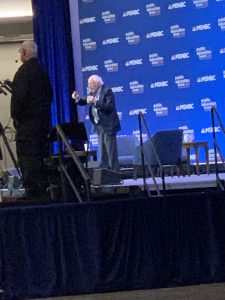 An obvious favorite with the teachers in the house, Sanders entered the stage to a hero’s welcome. He was his usual garrulous self, alternately grousing and charming. Rumpled and tousled, Sanders is in many ways the anti-politician, and is unique in American politics. And teachers love him.
An obvious favorite with the teachers in the house, Sanders entered the stage to a hero’s welcome. He was his usual garrulous self, alternately grousing and charming. Rumpled and tousled, Sanders is in many ways the anti-politician, and is unique in American politics. And teachers love him.
More than any of the other candidates, Sanders seemed to get lots of “softball” and non-education questions, which he answers with his patented repertoire of economic inequality retorts. As expected, Sanders’ best moments have to do with economic and labor issues: canceling college debt, making public colleges tuition-free, eliminating right-to-work laws, and strengthening unions. His best education response was on his opposition to No Child Left Behind because of its reliance on standardized testing.
Sanders may be the most consistent political leader in the field, if not our nation’s history, and nothing he said at the Public Education Forum changed that record. The teachers in the hall loved Bernie, and his support among the members of the profession remains strong.
Sander’s rating: 4 = consistent, strong focus on labor and strengthening teachers’ union protections; HIGHLY EFFECTIVE
Rating with VAM: same; VAM is terrified of Sanders!
Tom Steyer
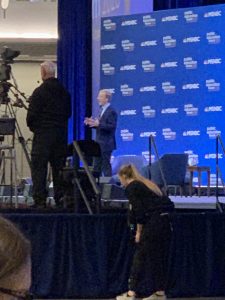 Steyer took the stage to what could only be called tepid applause. And things went downhill from there.
Steyer took the stage to what could only be called tepid applause. And things went downhill from there.
Now, don’t get me wrong–Steyer seems like a decent guy, and I think he means well. But the crowd just wasn’t buying what he was selling, and his time on stage dragged like a bad stand-up comedian bombing at an improv session. I was left thinking that Steyer knows he should care about education–he just doesn’t…or at least he hasn’t.
While Steyer’s performance may not have been an attention grabber, the best question of the day came during his session. And it came from a 6th grade student…
This young woman asked the best question of the day–why does my public school not have a librarian or a music teacher when the school a few miles away does?
She's my new hero.
Every child deserves a rich curriculum including music, art, PE, & libraries.#PublicEdForum https://t.co/HuW2p9ceHI
— Mitchell Robinson (@mrobmsu) December 14, 2019
By this point I had zoned out listening to Steyer drone on up on the stage, and was dreaming about a world in which Steyer, Michael Bloomberg, and Donald Trump just paid their fair share in taxes, and we didn’t have to rely on GoFundMe’s, mattress fundraisers, and bake sales to fund our schools. A world in which there aren’t poor schools, and rich schools, just excellent public schools. Schools that are adequately funded, with rich curricula that include music, art, PE, libraries, school nurses, foreign language teachers, counselors, school psychologists, and all of the support personnel and staff that help students learn and grow.
Tom Steyer has no business running for president–he should be using his vast resources to support the causes he believes in, not on campaign ads. Imagine the impact he could have running $20 million in impeachment ads in districts that can be flipped? But he is in so far over his head it’s actually troubling. Watching Steyer fumble around on stage for 30 minutes was like watching an unprepared 5th grader present a book report on a book he’d not read. Awkward, cringe inducing, and kind of pathetic. I think Steyer is a decent guy–he just should not be on the stage with the other candidates.
Steyer’s rating: 1 = stumbling, bumbling, unprepared; INEFFECTIVE
Rating with VAM: -2; Steyer should be using his immense wealth to make a difference for the causes and candidates he believes in–not by wasting millions on a vanity run to feed his ego
Sen. Amy Klobuchar
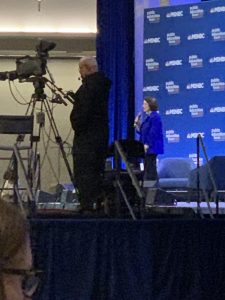 Amy Klobuchar was like a breath of fresh air after Steyer, and was absolutely the surprise star of the forum for me. I knew going in that Sanders and Warren were good on education, but Klobuchar was every bit as well prepared, thorough in her understanding of the issues, and communicated with skill, clarity, and grace.
Amy Klobuchar was like a breath of fresh air after Steyer, and was absolutely the surprise star of the forum for me. I knew going in that Sanders and Warren were good on education, but Klobuchar was every bit as well prepared, thorough in her understanding of the issues, and communicated with skill, clarity, and grace.
Klobuchar’s first words to the audience were about making the firing of Betsy DeVos her first act as president–an idea that the crowd embraced with obvious enthusiasm. She also managed an easy back-and-forth between endearing personal anecdotes (her story about her mom and Monarch butterflies was touching, and endeared her to the crowd), and sharp, insightful policy “takes” (a smart call for investments in school infrastructure).
Klobuchar came into the day as a “middle of the pack” candidate with little record on education, and finished the forum with a noticeable “buzz” about her chances.
She went up several notches for me.
Klobuchar’s rating: 3 = strong, caring, quick on her feet; EFFECTIVE
Rating with VAM: 4; when a young student asking a question stumbled a bit, Klobuchar handled the moment with compassion and sensitivity, encouraging and praising him as he worked through his question, mostly from memory–in short, she worked with him like a good teacher would, and the audience noticed.
VP Joe Biden
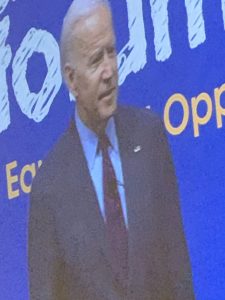 The last candidate of the afternoon was former Vice President Joe Biden, who flashed his trademark charisma as he took the stage. He then spent the first few minutes cleaning up some gaffes from an earlier debate before making some news…
The last candidate of the afternoon was former Vice President Joe Biden, who flashed his trademark charisma as he took the stage. He then spent the first few minutes cleaning up some gaffes from an earlier debate before making some news…
This is new from Biden: If I'm president, Betsy DeVos' ideas on charter schools are gone.
Given Joe's charter school history, this is important. The moderators should follow up on this, and pin him down.
Make it so, Joe.#PublicEdForum
— Mitchell Robinson (@mrobmsu) December 14, 2019
And the news kept coming:
NEW: Biden's answer to Denisha Jones' question about testing is an abrupt 180 from the policies of the Obama-Biden-Duncan-King administration–so this would be a big change…#PublicEdForum
— Mitchell Robinson (@mrobmsu) December 14, 2019
In the span of about 5 minutes, Biden reversed course on two of the major planks of the Obama era’s education policy platform: support for charter schools and standardized testing. If true, and not merely another instance of Biden-esque verbal imprecision, these are major reversals that signal a return to traditional Democratic policy positions.
Biden’s rating: 3 = Joe is an old-school politician, and knows how to work a room–his support and respect for the profession of education is clear and honest–he says that if he is president, teachers will have a friend in the White House, and I think teachers believe him; the concern is whether his apparent reversals of course on charters and testing are lasting, or fleeting; EFFECTIVE
Rating with VAM: 3; oddly, Biden is both the safest, and the most risky candidate in the field–he represents the security of the Obama era, and the danger of nominating a 77 year old man with a history of unforced errors and self-inflicted errors as long as his record in public office
Perhaps the day’s biggest victory was that most of the major presidential candidates were finally gathered on the same stage to discuss public education with an audience of nearly 1500 public school student, teachers, and activists. And the fuzzy picture of where these candidates stand when it comes to our public schools became a little bit clearer. Let’s hope that this turns out to be more than a bone thrown to the country’s 3.2 million public school teachers, and is instead a sign that at least one party is focusing on our nation’s future, and our greatest resource–our public schools.
